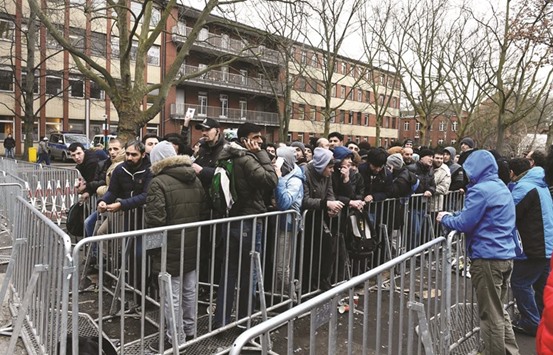The number of refugees arriving in Germany is falling sharply as a result of the closure of the Balkans migration route and the EU’s deal with Turkey, government figures showed yesterday.
In April, May and June, the number was around 16,000 each month, less than a fifth of the tally seen at the start of the year, according to data from the government’s Easy computer system, which counts the number of arrivals who plan to seek asylum.
In June, the system registered 16,335 people compared with 91,671 in January and 61,428 in February.
“We see that the measures taken on the German and European level are having an effect,” Interior Minister Thomas de Maiziere told journalists.
He observed a “tangible easing” of the situation compared with last year when more than 1mn people arrived in Germany seeking asylum.
Under intense political pressure, Berlin has been at the forefront of European efforts to secure a deal with Ankara under which EU countries can send people entering their territory illegally back to Turkey – if they take in bona-fide refugees in return.
The agreement has been criticised by numerous human rights organisations as running counter to EU and international law.
Balkan countries have also closed borders along the main route through Europe from Greece, where most refugees from the Middle East first set foot on EU territory.
“The refugee crisis has certainly not been resolved.
But the solution is progressing well in Europe and very well in Germany,” de Maiziere said.
According to the government data, Syrians were the most numerous asylum applicants in the first half of the year, at 171,488.
Afghans, with 60,611 requests, and Iraqis, at 56,540, accounted for second and third place.
Germany’s Federal Office for Migration and Refugees (BAMF) – which has come in for harsh criticism over its slow response to the crisis – said that it had processed 283,236 asylum applications in the first half of 2016, more than double the number in the same period in 2015.
The figures come just one day after Berlin lawmakers voted through tough new rules on asylum and integration.
While refugees will have access to subsidised integration and language courses, those who fail to take them up will be denied residency permits.
Chancellor Angela Merkel’s right-left coalition government has come under increasing pressure from public opinion and a populist challenge from the young Alternative for Germany party to tighten conditions for refugees already in the country and limit the influx of people.
Meanwhile, a Serbian minister has said that around 100,000 migrants from Middle East, Asia and Africa have passed through Serbia so far in 2016 despite the closure of the so-called “Balkan route” which hundreds of thousands used last year to reach Western Europe.
“This means that the Balkan route still exists and people are now moving to European Union countries with greater and greater difficulties,” the Tanjug news agency quoted Aleksandar Vulin, minister in charge of social welfare, as saying.
More than 650,000 people, many of them fleeing war and poverty in the Middle East and elsewhere, passed through non-EU Serbia last year on their way to the European Union.
This route was largely shut down in March after a series of border closures by EU states.
Last month Hungary, Serbia’s northern neighbour and an EU member, adopted a law that allows police to send back illegal migrants detained within 8km from its razor wire-fenced southern frontier with Serbia.
Hungary has also limited the number of daily admissions into the transit zone to 30.
The move created a bottleneck, with migrants creating makeshift camps near the transit zones between the countries.
According to United Nations refugee agency (UNHCR) yesterday, there were around 1,300 migrants in open air centres and makeshift camps near Hungarian border and a total of around 2,300 in Serbia as a whole.
“Close to 800 asylum-seekers are waiting in the open on Serbian territory outside the Hungarian ‘transit zone’ near Horgos border crossing, where overall conditions, particularly lack of shelter, health and sanitation represent major challenges,” it said in a statement.
Over past three months a majority of migrants who entered Serbia came across Bulgarian border after an arduous journey by land from Turkey, Vulin said.
He said Serbia would not allow its border to become a bottleneck where migrants would amass after EU states closed their borders.
“Because of closed borders Serbia may find itself in a problem, Serbia will not allow that,” he said without specifying whether Belgrade would also seal its borders.

This file photo taken on January 27 shows migrants queuing up next to a tent at the State Office of Health and Social Affairs (LAGeSo) in Berlin. The number of refugees arriving in Germany is falling sharply as a result of the closure of the Balkans migration route and the EU’s deal with Turkey, government figures showed.


